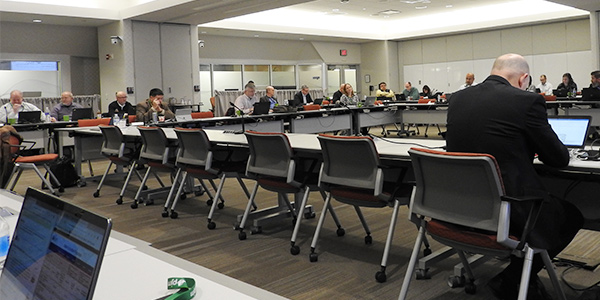By Rory D. Sweeney
Indemnification Conversation
VALLEY FORGE, Pa. — The PJM Market Implementation Committee will host a discussion on indemnification for financial transmission rights bilateral contracts at its Jan. 9 meeting.
The discussion, which was promised at the Dec. 5 meeting of the Markets and Reliability Committee, is intended to determine how PJM will respond to a deficiency letter FERC issued in response to one of the RTO’s proposed revisions to its FTR credit policies following the historic GreenHat Energy portfolio default.
PJM plans to request that FERC dismiss its filing, making the deficiency notice moot. But Shell Energy told the MRC on Dec. 5 that it wants to see the commission rule on the underlying indemnification issues that Shell pointed out in protesting the filing. (See “Bilateral FTR Retraction,” PJM MRC/MC Briefs: Dec. 6, 2018.)
FTR Collateral

Stakeholders voted overwhelmingly in favor of PJM’s original proposal on revising its FTR credit requirements to include a “mark-to-auction” (MTA) provision. The proposal, known in the stakeholder process as G1, received 0.93 in favor in a contemporaneous vote with several alternatives and 0.93 in favor compared to maintaining the status quo.
The proposal has the potential to delay clearing of auctions and posting of results because of intra-auction collateral calls for undercollateralized portfolios. Delayed results have happened twice in the history of PJM’s FTR markets. Both times were in March 2017, caused by “super overlapping” clearings from multiple FTR auctions ending at the same time. PJM has since implemented rule changes to avoid that situation. (See “FTR Revisions Approved over Financial Dismay,” PJM MRC/MC Briefs: Jan. 25, 2018.)
An alternative proposal that only applied the collateral call for portfolios undercollateralized by at least $100,000 failed to receive stakeholder endorsement, with 0.14 in favor. Another that used the same analysis and requirements but removed bids from undercollateralized portfolios rather than making intra-auction collateral calls also failed with 0.3 in favor.
Suffolk Fund’s James Ramsey campaigned for two other alternatives that would have applied a credit requirement that is the higher of either the existing requirements or the MTA plus an adder. One included the $100,000 threshold while the other did not. He said the endorsed proposal would be “challenging to do” because it requires forecasting many variables and might require very small collateral calls that could exacerbate delays.
FTI Consulting’s Scott Harvey, retained by PJM to analyze the issue and compare the proposals, said all of the alternatives are sound, but that Ramsey’s proposals have “ad hoc parameters” that risk running down a portfolio’s initial credit margin at the wrong time because the margin declines as losses occur in the portfolio. His analysis found that two situations in the history of PJM’s FTR market wouldn’t have been covered by Ramsey’s proposals, but both were from the GreenHat default and would have been undercollateralized by more than $20 million.
“If they have a big loss when the margin’s reduced, you have the opportunity for a big default,” Harvey said.
Ramsey’s proposals failed to receive stakeholder endorsement, with votes of 0.23 and 0.08 in favor.
A third set of alternatives would have combined both to make the credit requirement the higher of the current credit requirement plus the MTA or the MTA and Ramsey’s MTA adders. That set differed on the option for the $100,000 threshold. However, they were removed from consideration before the vote.
PJM said it is targeting January to file the endorsed proposal with the intention of implementing it in April.
Fuel Cost Policy Special Session
Since the MIC’s agenda was short, staff decided to include a special session on considering tweaks to several parts of the fuel-cost policy (FCP) rules and cost-based offer procedures hashed out last year. The sessions started after the MIC approved a problem statement and issue charge in September. (See PJM Stakeholders Seek More Flexible Fuel Cost Rules.)
Joe Bowring, PJM’s Independent Market Monitor, questioned whether the process could be used to completely eliminate FCPs.
John Rohrbach of ACES, who initially proposed the re-evaluation, assured Bowring “our goal is not to vitiate” the FCP process.
“Or eviscerate? … Just checking that you don’t want to do either,” Bowring responded.
The session identified 14 factors to consider changing or adding.




